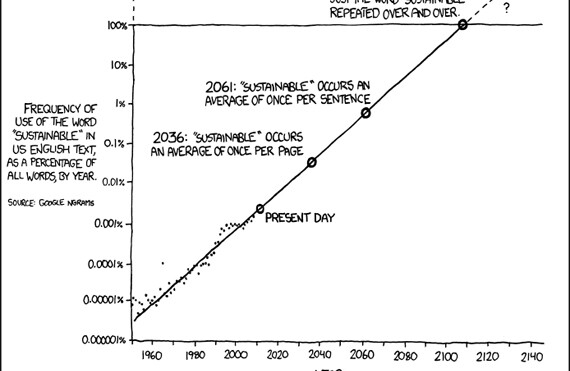A web comic by Internet satirist Randall Munroe (xkcd.com) predicts that the word "sustainable" will be used on average once per sentence by 2061. There is great truth in this joke—the ease with which "sustainable" rolls off the tongue these days far surpasses our understanding or implementation of it.
I have been working in the sustainability field for five years as a higher education administrator and adjunct professor, so I think about the definition of sustainability on an almost daily basis. Lately I've been trying to figure out whether "sustainability" is even the best word to describe what I do. According to Confucius, wisdom begins when we call things by their right names: If names be not correct, language is not in accordance with the truth of things. If language be not in accordance with the truth of things, affairs cannot be carried on to success. We must do justice to our work by giving it the right label, and after some careful thinking I believe the sustainability movement is due for a change.
Sustainability requires and seeks to maintain a state of balance. Yet in a world where it seems that balance (whether ecological, economic, or otherwise) has become a speedy and accelerating target, even our best guesses at what the future holds admit a tremendous range of possibility. Wouldn't it be better to focus on approaches that maximize readiness for the unexpected and the ability to bounce back?
In many ways, balance is something we left behind quite a long time ago. There is no going back to a prehuman state of ecological balance, if such a thing ever existed in a world of flux. Geologists now debate whether to declare a new epoch: the Anthropocene, notable in that human impacts have become a dominant global force. Writer and activist Bill McKibben has redubbed our planet "Eaarth" because of how little our new climate resembles the old. Environmental policymaker Lester Brown has written multiple "Plan B" contingencies for all the interlocking crises we will face: food, water, energy.
The atmospheric concentration of carbon dioxide will soon exceed 400 parts per million—43 percent higher than preindustrial times—yet we cling to abstract visions of a sustainable future where we've achieved Zen-like equilibrium between environmental and human systems. I don't buy it.
Sustainability is the Rogaine of social movements: What we want is a full head of hair, but we're stuck with less baldness.
From a marketing perspective, sustainability is an advertiser's dream. It is an outcome that can never truly be reached, but its allure is undeniable. In its current form, sustainability is the Rogaine of social movements: What we want is a full head of hair, but what we're ultimately stuck with is less baldness.
Despite its best efforts, the sustainability movement has been unable to shake one of its crudest definitions: that sustainability refers to maintaining things indefinitely. At the 2012 Rio summit, we saw sustainability creatively reinterpreted as "sustained growth," a term which was used interchangeably with the once-sacred "sustainable development" a total of 16 times in the conference declaration. This revisionist view of sustainability, built on a business-as-usual approach, might appeal to rich countries that wish to protect their turf or poor countries that fear a green boot may be kicking away the development ladder, but ultimately it lacks the steam to push the sustainability movement forward (and will likely send it in reverse).
Similarly, attempts to quantify sustainability have ended up expanding it or blurring its edges at least as much as they've helped to define it. The Ecological Footprint attempts to capture the full spectrum of lifestyle impacts. The UN Human Development Index urges a shift toward people-centered indicators rather than solely examining economic factors to gauge quality of life. While these are certainly healthy attempts to clarify the definition of sustainability, many of their criteria remain highly subjective, and the prioritization of some indicators over others within each framework creates commensurability problems. Sustainability is a big tent, and as such, defining the movement inevitably alienates some of its followers and while attracting others who are interested in coopting one of its many incarnations.
Many existing definitions and frameworks fall short in their failure to prioritize intergenerational equity. This is to be expected, as we tend to be impatient, short-term thinkers, and we have yet to figure out how to appropriately value the future amid constant pressure to deliver immediate results. Perhaps the best way to do that is to admit a greater degree of uncertainty, rather than attempting to create comprehensive sets of categories, definitions, and metrics. Doing this, however, would require us to recalibrate our notions of sustainability to give greater respect to change, unpredictability, and volatility.

For me, Hurricane Sandy was an invitation to revisit the purpose of my work and to call into question the trajectory of the sustainability movement. One of the most powerful images from the storm was of a premature baby being transferred from the intensive care unit of a darkened hospital. It became clear that the real test isn't about our ability to perform under perfect conditions, but rather how we respond to stress, turmoil, and outright chaos.
Does it make sense then for us to shift from sustainability to resilience thinking? Approaches that optimize resilience will perform well under a range of conditions. Moreover, a sustainable thing that isn't also resilient can be incredibly vulnerable to shocks. A resilient thing can perform in the absence of equilibrium because of its capacity to adapt.
The argument for greater resilience isn't just about physical systems but about the need for more resilient people. One of my favorite discussions with students each semester is about practical skills that could be applied in the absence of basic social services and functional infrastructure. I call this lesson "Sustainability in the Zombie Apocalypse." I typically get responses like "I can provide leadership amid social disorder" before students realize that leadership won't feed them or keep them safe. Forget things like gardening, carpentry, sewing, and food preservation—most students don't know how to cook. We quickly reach the conclusion that self-reliance is largely nonexistent, and without a foundation of practical skills, resilience can be difficult.
Unfortunately, our education system is poorly equipped to handle this reality. Scott Carlson, a writer for the Chronicle of Higher Education, sums up the issue well in saying that lots of young graduates are eager to tackle urban agriculture problems but don't know the first thing about building a raised bed.
I'm not suggesting that we jettison sustainability or that we ditch mitigation efforts. The sustainability movement needs to evolve in order to capture resilience, and we should continue to learn from nature and use it as a model wherever possible. Nature is full of shocks and stresses and organisms that respond beautifully, wielding the embodied knowledge of millions of years of survival.
Nature is full of organisms that respond beautifully to shocks and stresses, wielding the embodied knowledge of millions of years.
Despite popular perceptions of frailty, some ecosystems and organisms possess incredible resilience. Corals off the coast of Eritrea, some of the most robust in the world, are being studied for their temperature tolerance. It's well known that salamanders and starfish can regrow limbs, and there is even a species of jellyfish, Turritopsis nutricula, that engages in a kind of reverse metamorphosis during conditions of stress, akin to a frog turning back into a tadpole. With this capacity for transdifferentiation of its entire body, scientists suggest that once Turritopsis reaches sexual maturity, it can repeat its lifecycle indefinitely.
Perhaps more than resilience we should be aiming for something like "antifragility," a term coined by author Nassim Nicholas Taleb in his recent book. Taleb argues that comfort, predictability, and stability lead to vulnerability, and that periodic stressors provide necessary checks to systems that would otherwise be increasingly exposed to risk. Unexpected events allow us to grow smarter and stronger over time. An antifragile attitude would embrace conflict and learn from failure.
To this crowded ecosystem of jargon I offer a new term that will hopefully gain a foothold among sustainability advocates: "cambiophilia," meaning an affinity for change. In a future of growing uncertainty, this should be paired with an ethic of continuous improvement, or kaizen in Japanese.
If we can practice cambiophilia, we will have less to fear. If we cannot adopt a change-loving attitude, we run the risk of fooling ourselves into thinking that the unexpected cannot happen, and we will continue grasping for a state of balance that is simply beyond our reach.
IMAGE CREDITS: Randall Munroe (CC); cuttlefish (CC).




